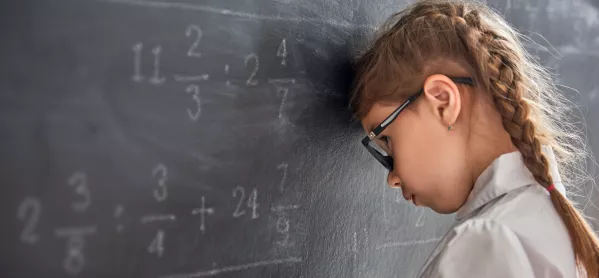Why the key to keeping maths students engaged could be... a wardrobe

Imagine a universe where your pupils are enthused by statistics and excited by Pythagoras. Too good to be true? Not so, says maths teacher Graeme Austin - you just need to take inspiration from the world around you
For many pupils, teachers and other adults, the idea of maths being fun is an oxymoron - and the thought of it being exciting even more incomprehensible. Yet I have witnessed students who are genuinely thrilled to be solving a problem using Pythagoras’ Theorem.
The simple truth is that maths is no more or less exciting than any other subject; the challenge lies in how it is taught.
One pupil in a previous school always asked me the same question every time we started a new topic: “When am I going to use this outside the classroom?” This query is a bugbear for many maths teachers but I always had a viable answer. I spent years working in the private sector and, as a result, I have experience of using a huge variety of mathematical techniques and knowledge in a number of industries. And I bring all that experience into the classroom, every day.
For example, statistics are the bane of many sixth-formers’ lives. Last year, I started the course by explaining to my pupils that, although getting an A-level qualification was a wonderful thing, by understanding statistical analysis they would also be able to charge £40,000 per year for a spreadsheet, as I had done in an operational performance benchmarking service I had owned. I never claimed that calculating the product moment correlation coefficient was going to be interesting, exciting or fun - and it wasn’t - but I captured my students’ imaginations from the get-go.
Building interest in Pythagoras
However, the experience you bring into the classroom doesn’t have to come from the workplace; my bedroom has been a source of discussion with every Year 8 class I have ever taught. Before the safeguarding alarms start sounding, I should explain that I used to live in a house where the master bedroom had a very low ceiling and I was building a flat-pack wardrobe. The instructions told me to rest the construction sideways and then raise it upwards once built. Using my knowledge of right-angled triangles, I calculated that this process would gouge a hole in my ceiling. So instead I built it upright.
When I teach Pythagoras, I show this problem to my pupils at the start of the unit and promise them that, by the end, they will be able to help me build a wardrobe. The unit lasts for three or more lessons and I can guarantee that at least one person will ask about the wardrobe in each one.
Pupils may have no connection to some dead Greek bloke from 2,500 years ago but they know the leading Swedish flat-pack furniture supplier in the UK - and are happy to tell me about the items their families have purchased from it.
Using pupils’ direct experience to explain ideas comes naturally in subjects such as geography, when so many students have seen a river or gone to a shop. Yet somehow maths is treated as an abstract reality without recourse to how it is used in the real world. Going back to the Greeks, they never split the subject into “pure” and “applied”; there was just mathematics. This pre-Socratic view of the subject is far healthier than tearing the subject asunder (as it was many centuries later, in order to make it easier to teach).
Supermarket sweep
Another example I use comes from my local supermarket, which sells two sizes of dishwasher tablet. I ask Year 7 pupils to help me decide which of them to purchase, weaving the problem into a story about the Austin household and its dirty dishes.
The follow-up question goes beyond the national curriculum and captures imaginations every time: why would a supermarket price its goods so the lower volume product is better value? This takes us from issues of ratio and immerses us in economic theory.
Eternal truths
Some people tell me that maths is dull because it’s the kind of subject that always remains the same. But, to me, the fact that maths never changes means something different: my subject is the only one apart from philosophy where we talk about eternal truths every day.
This love of my subject hasn’t come from teaching it for 25 years; it has come from using it for more than 25 years as an adult. Pure maths - we’re talking algebra here - is the bedrock of the most useful knowledge our pupils will ever acquire, aside from English language skills, and the real world provides a plethora of examples that we can use to prove it to them. All we have to do is grab the relevant resources and use them.
To be honest, that is easier said than done, because most resources labelled “real world” are not taken from everyday life at all. The examples don’t feel authentic and pupils can see their failings immediately. To redress the balance, I’m in the process of launching a website for maths teachers to share genuine real-life problems.
Until then, I bounce around my classroom throwing in life experiences and using a textbook for problem-solving examples. Of course, my A-level statistics classes will still be given the data on V2 rocket landings recorded during the Second World War and get to decide whether they were controlled remotely. This was my favourite question when I was in sixth form and I love to share it.
Graeme Austin teaches maths at Haberdashers’ Aske’s School for Girls in Hertfordshire. EDF Energy’s education resources include this lesson plan on energy consumption. EDF Energy is sponsoring the Maths Teacher of the Year award at this year’s TES Schools Awards.
